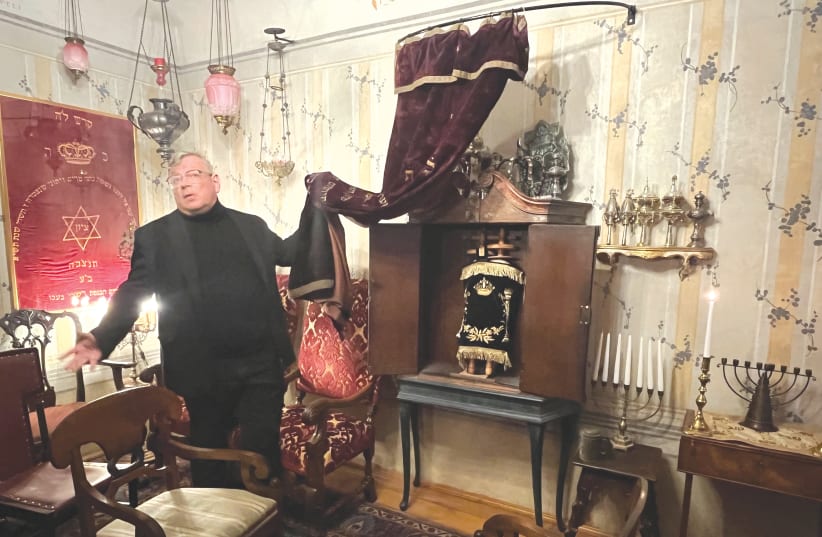Two weeks ago, I visited Slovenia as part of a World Jewish Congress (WJC) delegation. So far, the WJC, for which I am a Jewish diplomat, has sent four such delegations to countries in Europe at the invitation of the local Jewish community - usually in response to rising levels of antisemitism.
During the two-and-a-half-day visit, the delegation, comprised of Jews from 11 countries – met with high-ranking officials, the diplomatic community, and Slovenian government officials. Speaking alongside Robert Baruh Waltl, the official representative of the Jewish community in Slovenia, the aim was to have constructive conversations to garner tangible support for the Jewish community and its members.
The Jewish community in Slovenia is extremely small, mostly based in the capital, Ljubljana, and numbers less than 100 people. Like all Jewish communities, regardless of their size, they deserve to live freely as Jews without facing hate and discrimination. Sadly, however, like so many other communities around the world, the Jews in Slovenia have experienced a sharp increase in antisemitism since October 7.
The Jewish Cultural Center (JCC) Ljubljana has been the scene of protests and vandalism; its front door was spray-painted with graffiti equating a swastika with a Magen David and was later set alight.
Waltl, the founder of the community, who devotes his life to revitalizing the Jewish community in Slovenia, has been personally threatened with a boycott at his other in his other employment, running the mini-theater next door to the Jewish community center, simply because he is a Jew. Disturbingly, Waltl was told that specific government ministries would not allow representatives to meet with a Jew while the war in Gaza was raging.
He also learned that he had been rejected for government scholarships because of the JCC’s ties to Israel.
Jewish connection concerns
With no Israeli embassy in Slovenia, people perceive the JCC as the only connection with Israel, so it is there they express their pro-Palestinian feelings and protest against the Jewish state. They are being attacked in the media and are feeling increasingly isolated. It is no surprise that the WJC is concerned for the community’s welfare.
Most of the meetings, which were conducted to raise awareness of the community’s plight, went well. The majority of the foreign ambassadors we met were open and receptive to us. They were shocked by the community's experiences and were interested in tangible steps to further support the Jews of Slovenia.
A disappointment came from the president of Slovenia’s own advisers, who brought up Islamophobia in our meeting about the Jewish community. This is a common tactic for those wishing to diminish Jew hate and erase its significance. Ultimately, it is a form of “all lives matter” of the Jewish experience.
Our last meeting was with Slovenia’s International Holocaust Remembrance Alliance (IHRA) delegation, of which Waltl is also a part. Per the EU’s recommendation, Slovenia has adopted the IHRA definition of antisemitism. Or rather, some of it (which is not actually an option). Rather tellingly, they excluded the 11 examples included by IHRA, which illuminate practical manifestations of antisemitism in a modern context.
Despite this, our meeting started well enough. The head of the delegation was polite, although initially, he seemed to explain recent anti-Jewish hate crimes as almost a natural response to the public’s perspective on recent events in the Middle East.
The WJC was clear in its reply, stating that irrespective of one’s perspective on this war between Israel and Hamas, the Jewish community should never be a target. That is racism, plain and simple.
Things became heated when the deputy head of the delegation, Blanka Jamnišek, responded to our testimony that Jews in Slovenia do not feel supported and safe. She seemed to ignore our concerns and Waltl’s. Jamnišek ended by asking the WJC: "What are you doing to ease the humanitarian crisis, stop the famine, and work towards a ceasefire?” She could see our shock before she even managed to finish her sentence.
Our faces must have betrayed our thoughts and feelings. Simply put, we were stunned. To experience antisemitism – as per the 11th example stated by IHRA in its definition (“Holding Jews collectively responsible for actions of the state of Israel”) – from an IHRA delegate member was outrageous.
We don’t always expect those we are meeting with to understand our position exactly or even to understand Jew-hate. They usually don’t. However, to experience such flagrant antisemitism from someone who is tasked with combating it was certainly a surprise.
Immediately, there was a swift and strong rebuttal from a member of the WJC team, stating clearly – even though it had already been said – that we were not there to discuss the Middle East conflict; we were here to discuss the safety of Jews around the world. To hold us responsible for the war or one’s perceptions of the war is highly offensive.
When Jamnišek refused to retract, our delegation stood up and walked out. It was the correct move. Even though this arm of the World Jewish Congress is focused on diplomacy, boundaries are crucial even in these highly sensitive discussions. As I have stated numerous times during my work on building Jewish pride, Jews must have boundaries. We should not sit in meetings or have conversations with those who refuse to listen to us and then throw anti-Jewish accusations at us.
As with any conversation, diplomacy must be a two-way street rooted in mutual respect and a desire to achieve the best outcome for all involved. No Jew, whether diplomat or otherwise, should sit in a room with people expressing extreme antisemitism.
After we left, we contacted the head of the delegation to ensure that our protest was understood as not directed at the whole of Slovenia’s IHRA delegation. But it was a response to Jamnišek’s comments. We explained that we were so outraged at experiencing Jew hate in a conversation meant to be focused on combating it that we had to leave. We then invited the head of the delegation to join us for a meal so we could have the constructive conversation we should have had to begin with.
This discussion was a much better experience. He listened and appeared to understand our perspective. We discussed tangible steps, including policing and appointing a special envoy to combat antisemitism, among others, that can support the Jewish community in Ljubljana and enable it to feel valued as a part of Slovenian society.
This was a deeply instructive and illuminating trip. It demonstrated the power of high-level conversations and diplomacy but also reminded me that just because someone is in a position of authority, it does not mean they understand issues such as Jew hate or are free of prejudice themselves. It also underscored the importance of Jews fighting back and not tolerating abuse. We have a duty to defend ourselves. We have a duty to defend the Jewish people.
Ultimately, every Jew, no matter where they live and no matter how small their community, has a right to live freely and proudly as a Jew.
This is what we are fighting for. This is what we are demanding.
The writer is the founder of the modern Jewish Pride movement, an educator, and the author of Jewish Pride: Rebuilding a People. His new book is Reclaiming Our Story: The Pursuit of Jewish Pride.

